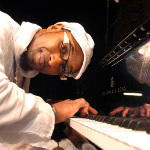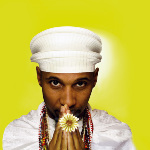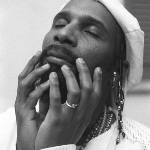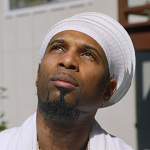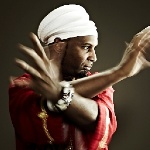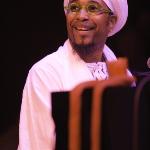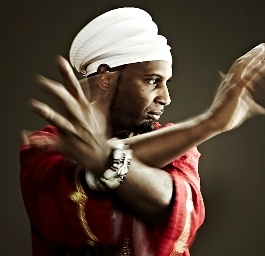
Songs
- country:Cuba
- style(s):Electronic, Jazz
- label:OTA Records
- type:Band, Solo, Composer/Songwriter
- gender:male
- instrumentation:instrumental
- artist posted by:Kino Music srl
Line up
- Omar Sosa (Piano)
Links
Omar Sosa is one of the most versatile jazz artists on the scene today: composer, arranger, producer, pianist, percussionist, and bandleader. He fuses a wide range of world music and electronic elements with his native Afro-Cuban roots to create a fresh and original urban sound all with a Latin jazz heart. On stage, Mr. Sosa is a charismatic figure, inspiring his fellow musicians with his dynamic playing and improvisational approach to the music an approach full of raw emotional power and humor. Mr. Sosa invariably inspires audiences to their feet and to join him in chorus vocals, heightening the sense of spontaneity and connection.
Mr. Sosa's latest CD on Ota Records, Mulatos , features Latin jazz master Paquito D'Rivera on clarinet. The recording is an adventurous, finely wrought, and wholly delightful melange of Cuban jazz, Latin dance grooves, French chanson, North African trance music, and European folk. It dances with rhythmic inspirations of Indian tabla, jazz drums, and studio mixing. Also featured is the delicate voice of the Arabic lute, the oud, and the composer himself on marimba. "Mulatos" was recently nominated for Latin Jazz Album of the Year by the NYC-based Jazz Journalists Association.
Mr. Sosa's music is a unique style of Afro-Cuban jazz, and while it is rooted in the folkloric traditions of the African Diaspora, he always takes an exploratory approach never one to let orthodoxy stand in the way of his pursuit of freedom. Sosa offers a joyful mix of jazz and Afro-Caribbean rhythms, combining percussive forays inside the piano and a series of electronic effects with his inspired, passionate playing at the keyboard. His tempos are fluid, and his moods change freely. Sosa revels in the irresistible clave grooves of Latin jazz, while adding experimental touches to keep his listeners on their toes.
Omar Sosa has released 15 recordings on the Oakland-based Ota Records label since 1997, including 2002's GRAMMY-nominated Sentir . He performed recently with his Octet at the opening of Carnegie Hall's new Zankel Hall, about which Alex Ross of The New Yorker remarked that Sosa has "a ferocious flair for rhythm and a keen musical wit". Composer John Adams, who curated the opening of Carnegie Hall's new venue, commented that "Sosa is a deeply creative musician with an extraordinary harmonic sense. His piano playing is sui generis : It has obvious roots in Cuban music, but he's taken his approach to the keyboard into completely new regions". And Don Heckman of The Los Angeles Times recently wrote "Sosa's vision of contemporary jazz reaches across every imaginable boundary".
Omar Sosa was nominated in 2003 for a BBC Radio 3 Award for World Music in the 'Americas' category, along with Ibrahim Ferrer, Caetano Veloso, and Os Tribalistas. He began 2004 with the debut of his first work for symphony orchestra, entitled From Our Mother , performed at the Paramount Theatre in Oakland by the Oakland East Bay Symphony under the direction of Michael Morgan. The 45-minute work in three movements, which combines folkloric elements from Cuba, Venezuela, and Ecuador with modern jazz harmonies, was co-commissioned by Yerba Buena Center for the Arts in San Francisco and the Oakland East Bay Symphony, with partial funding from the Rockefeller Foundation.
For Afreecanos, Omar chose to collaborate with a vast array of artists in a decidedly Pan-African milieu. He achieves this in a seamless manner, with a remarkable fusion of musical elements. Though blessed with impressive chops, Omar never dominates, choosing instead to bring a thoroughly democratic mindset that favors the whole rather than displays of virtuosity. In many ways this is a composer's date. The sense of peace and universality of Africa and Diaspora perspectives is impressive. The ultimate effect of the Afreecanos listening experience leaves one marveling at the broadness of viewpoints. Sosa's menu for Afreecanos includes artists and flavors from Cuba, Mozambique, France, Senegal, Mali, Brazil, Guinea, and Morocco.
Prominent among Omar's recent projects is Across The Divide (Half Note, 2009), recorded live at the Blue Note in New York City. Across The Divide is a song cycle documenting the shared rhythms of Omar Sosa and Tim Eriksen, an intense vocalist, equally versed on guitar, fiddle and banjo, and a leading exponent of the enduring spirit of a North American music that transcends racial and cultural categories. The album is a narrative, a tale of musical and spiritual passage, melding and mingling seemingly disparate cultures yet highlighting the musical roots common to us all. Across The Divide achieves something heretofore unknown in contemporary U.S. jazza powerful encounter between Anglo North American folk traditions and the living spirit of the Diaspora, an audacious revelation whose ecumenical power is testimony to the promise of Gandhi, King, and the many other ancestral spirits that suffuse Sosa's artistry.
Another recent work is Tales From The Earth (Ota, 2009), led by flute player Mark Weinstein. The recording presents a thoroughly cosmopolitan outlook rooted in the rhythmic intensity and improvisatory, call-and-response spirit of Africa writ large. Artists of Cuban, Haitian, West African, European, African American, and Jewish American heritage, entered a Berlin studio for two days of intensive recording, without music or a predetermined conception, only a shared commitment to the communal, celebratory character that embodies the expressive riches of Mother Africa. Tales From The Earth resounds with Afro-Cuban traditions, featuring Omar on marimba and vibraphone, which he studied in Cuba's conservatories before switching to piano. Other guests include guitarist Jean Paul Bourelly; balafon master Aly Keita of the Ivory Coast; drummer Marque Gilmore; and singers Aho Luc Nicaise and Mathias Agbokou of Benin.
A major new project bears the fruit of Omar's first big-band collaboration, working with composer Jacques Morelenbaum and Hamburg's North German Radio (NDR) Big Band. Recorded in January 2008, it features arrangements from Omar's Spirit Of The Roots (1999) and Bembon (2000), and two new compositions, "Llegada Con Elegba" and "Salida Con Elegba". Ceremony premiered in March 2010 at the Festival Banlieues Bleues of Paris and in NDR studios in Hamburg.
Other notable ventures include Omar's Oda Africana, a composition for orchestra and jazz ensemble, which premiered in July 2009 at the Festival de Musicas Religiosas y del Mundo de Girona, Spain, featuring the Omar Sosa Quintet and the Jove Orquesta Athenea, conducted by Lluis Caballeria.
New pursuits include work with Italy's Solis String Quartet, the Sardinian Isolanos and Abbas y Aguas projects, and a new trio with Paolo Fresu and Trilok Gurtu. Notable video productions include Light In The Sky (from the 2008 Tudo e Jazz Festival in Ouro Preto, Brazil, directed by Aitor Echeverria), and an upcoming DVD of Omar's 2007 Java Jazz Festival performance.
Exemplifying Duke Ellington's highest accolade as a creator of music beyond categorymanifest in some 20 recordings as a leaderOmar Sosa is a planetary musician in the most all-embracing connotation of world music. Sonic curiosity, a generous musical spirit, a commitment to the ensemble as the fundamental creative mode, and an openness to new sounds and their unusual combination, animate all that Omar does.
Omar's search for musical freedom transcends orthodoxy, as an artist who exemplifies Monk's determination never to play the same thing twice. He crafts a stylistically unique yet thoroughly contemporary global jazz idiom that celebrates the diversity of voices in the music of the Americas and far beyond.
Yet Omar always cultivates an intimate sense of connection with his own Afro-Cuban roots. As he relates, "Africa and the Diaspora represent an unequaled musical source. I have tried to express the continent's melodic contour, and its great rhythmic strength. Rhythm connects every people with the supreme Spirit. Every land has ways of calling the Spirits, to pull people together. Philosophically, through jazzperhaps the Diaspora's freest genrewe have sought to combine the Caribbean, Latin America, and Africa in an expression of freedom, a celebration of the Diaspora, alive in our times."


